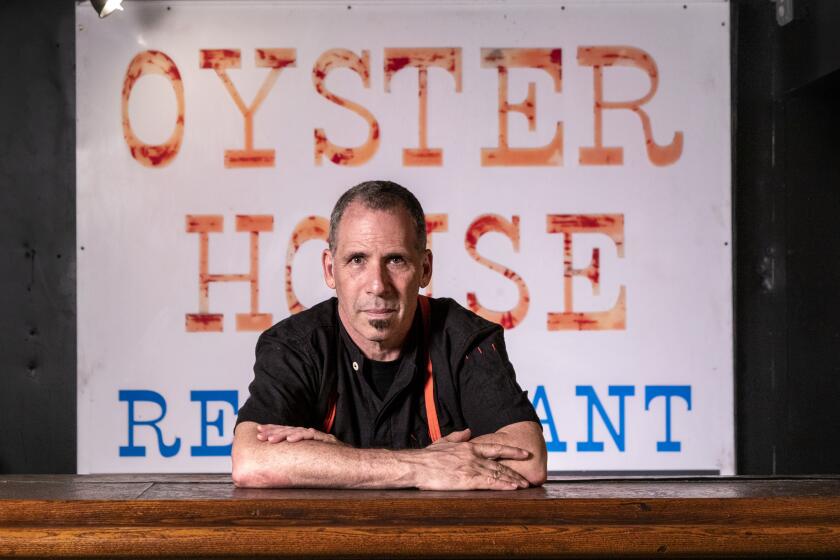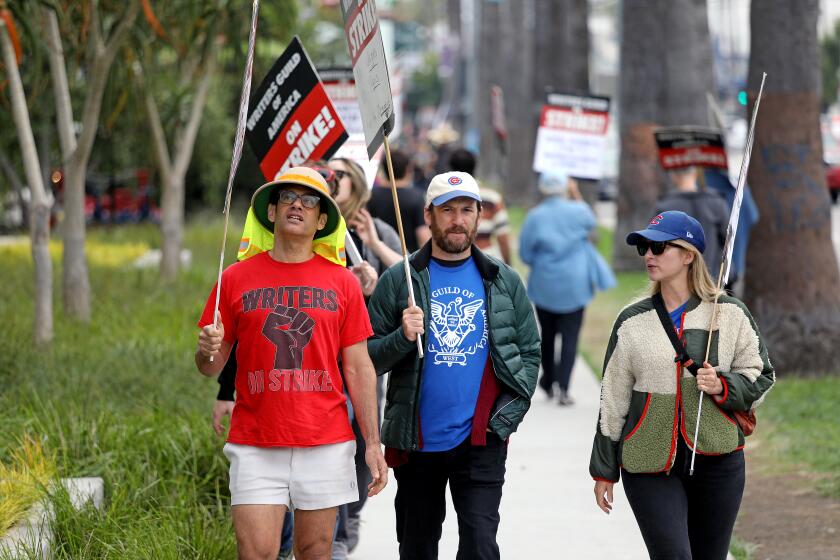The WGA strike has hit some restaurants hard. They’re rallying behind it anyway
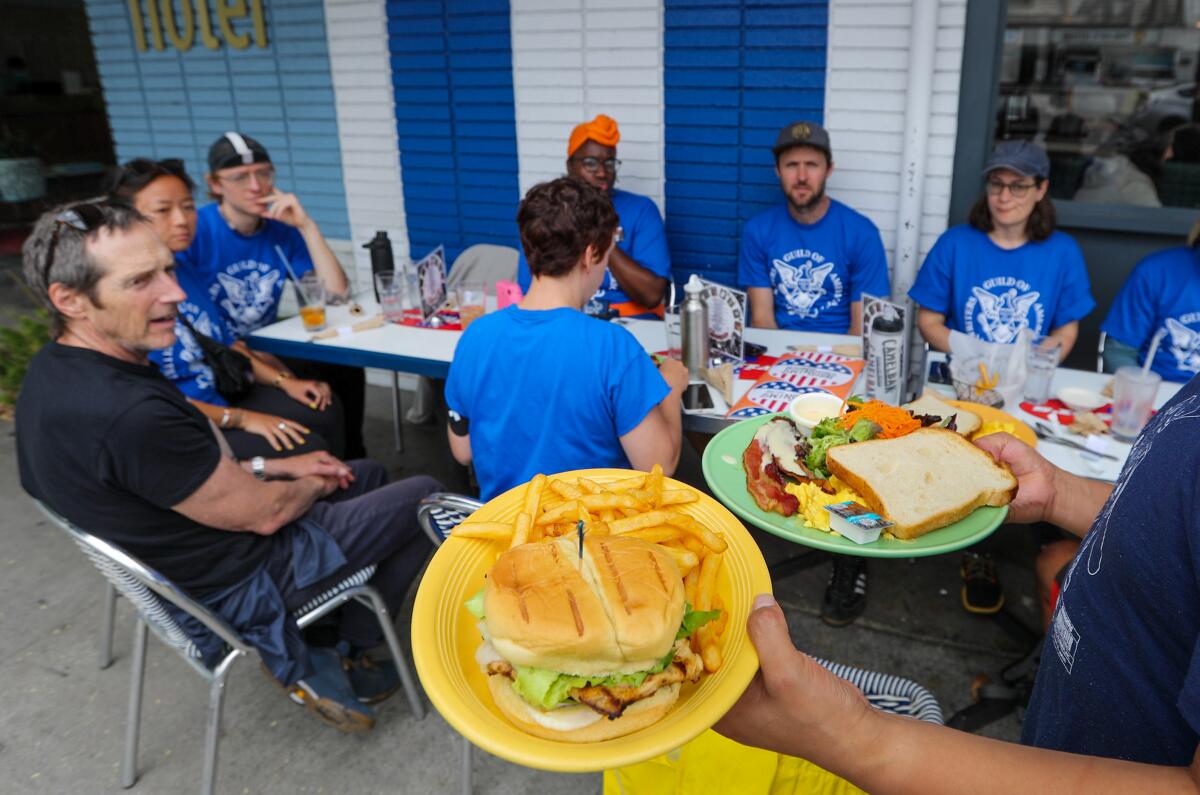
- Share via
Entertainment-industry eyes are on the Writers Guild of America as it enters its third month of strikes for higher pay, streaming residuals and more — but so are those of the chefs, restaurateurs and bartenders who make Los Angeles’ sushi rolls, tacos, bagel sandwiches and cocktails that fuel studio sets, business lunches and, now, picket lines.
As production shuts down across the county’s major studios, many restaurateurs who rely on catering, industry meetings and private events are noticing a decline in revenue, some as much as 30% to 40% since the strike began. Despite the challenges, many are still feeding the picket lines and offering discounts for card-carrying WGA members, providing support through food.
Evan Fox, owner of popular Yeastie Boys bagel trucks, relies heavily on events and catering such as set visits. “A lot of our business is writers,” Fox said. “A lot of our business is people that work in the industry because this entire town is built on that, so it’s like, ‘All right, well, if that goes away, what does that look like?’”
Fox has seen a 10% to 15% decrease in his business: fewer walk-up orders, along with an overall collapse of on-set catering gigs. Before the strike, Yeastie Boys would drive onto studio lots across L.A. as often as twice a week at least, frequently hired by producers, celebrities or executives as a wrap gift for a show or film crew. Since the strike began, his business has been hired to set once, for a game show. But in the last month and a half, Yeastie Boys has occasionally been hired by celebrities such as Snoop Dogg and Dr. Dre and comedian Nick Kroll and the cast of TV show “Big Mouth” to feed picketers stationed at the gates of studios, which Fox says helps offset losses but isn’t sustainable if the strike continues into fall or winter.
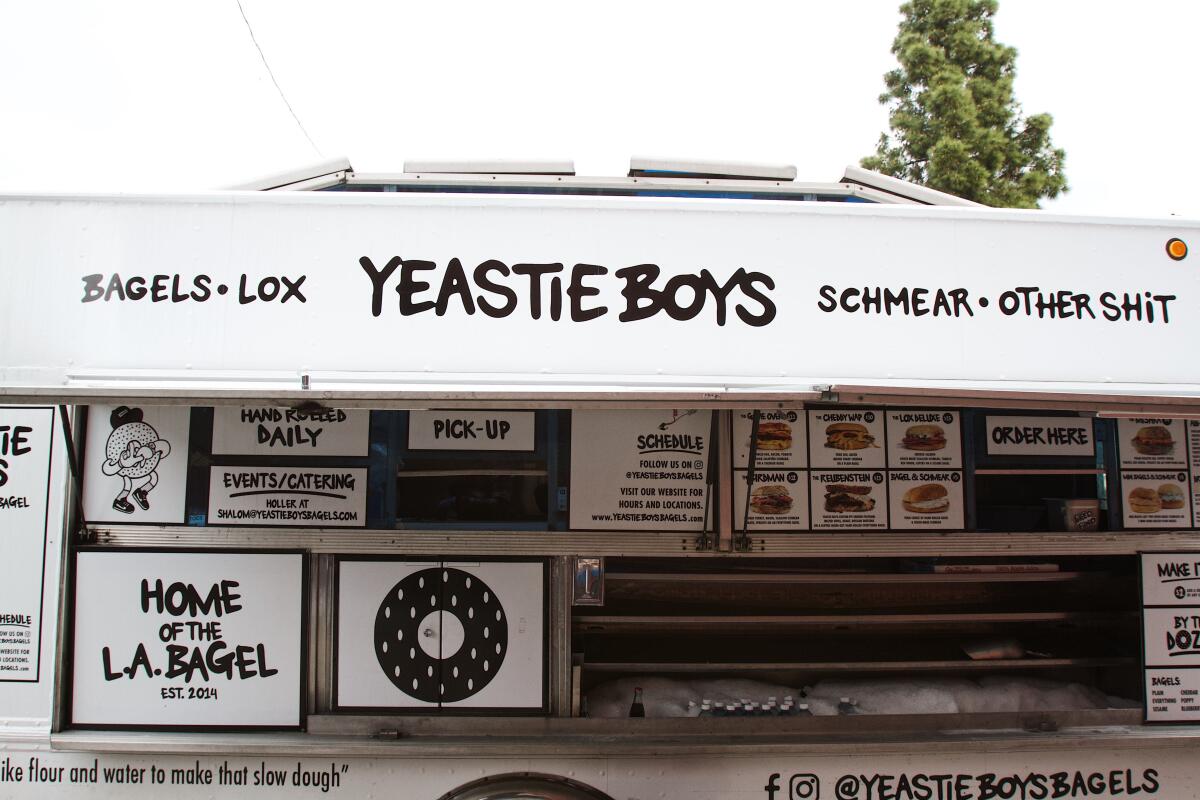
But if he also takes off-lot event jobs for companies like Amazon Studios in order to keep his business afloat, he wonders: Is he fully supporting WGA members? “I’m just slinging bagels on a truck; if I don’t take those big gigs, then I’m gonna have to start laying off people and I don’t want to do that,” Fox said, adding, “I don’t want anybody to be like, ‘Oh, these guys are f—ing scabs,’ or whatever. It’s like, shoot, I gotta feed my staff.”
As he navigates the trickle effect of the strike on his own business, he says that he hopes to continue feeding those on the picket line and that the WGA can negotiate a fair contract soon.
Restaurants near the studios are also feeling the impact as lunches, private events and deliveries to studio offices decrease.
Studio City sushi spot Kiwami, which regularly services CBS, Warner Bros. and NBCUniversal in addition to on-site business lunches, has seen a 5% to 10% dip in revenue since the strike began, manager Joe Bezoian said. It’s primarily due to a slowing of takeout and delivery orders for the studios, though the average check total has also decreased. The manager likens it to a chain reaction.
At Hollywood bar Three Clubs, WGA members will receive half off their tab for the duration of the strike, among other deals popping up in support.
Given Kiwami’s location, members of the entertainment industry are “who built our restaurants,” Bezoian said, adding the staff empathizes with all the striking WGA members — though negotiations and confrontations occasionally play out in the dining room. Since the strike began, on more than one occasion, he says, the staff have witnessed industry tables approaching celebrity guests to voice displeasure about not feeling supported, or making recommendations for actions during the strike. “We feel like we’re in the middle of this,” he said. “We’re like, ‘Look, we just want to serve food.’”
Kiwami’s nearby sibling restaurant, Katsu-ya, has also been slightly affected by the strike. During the last WGA strike, which ran from 2007 into early 2008, the manager worked in Long Beach and Downey restaurants, removed from most L.A. studios, and noted that this is the first time he has felt the repercussions of a writers strike in an industry town. Today, Bezoian counts his restaurant as fortunate; he says friends at other Studio City restaurants have noted their own business is down as much as 20% to 40% and might need to lay off employees.
“Understandably, people are suffering and they don’t have a job, so yeah, it seems that they’re spending less,” said Bezoian. “We’re really lucky to have such a loyal following.”
A sushi spot closer to the Paramount Studios lot hasn’t been as lucky. “After striking, business is down,” Murakami chef Taro Sato said from behind the Melrose sushi counter. Owner Tomoko Bright estimates the restaurant’s loss in business is as much as 30% since the beginning of the strike for both dine-in and takeout, with takeout especially dwindling.
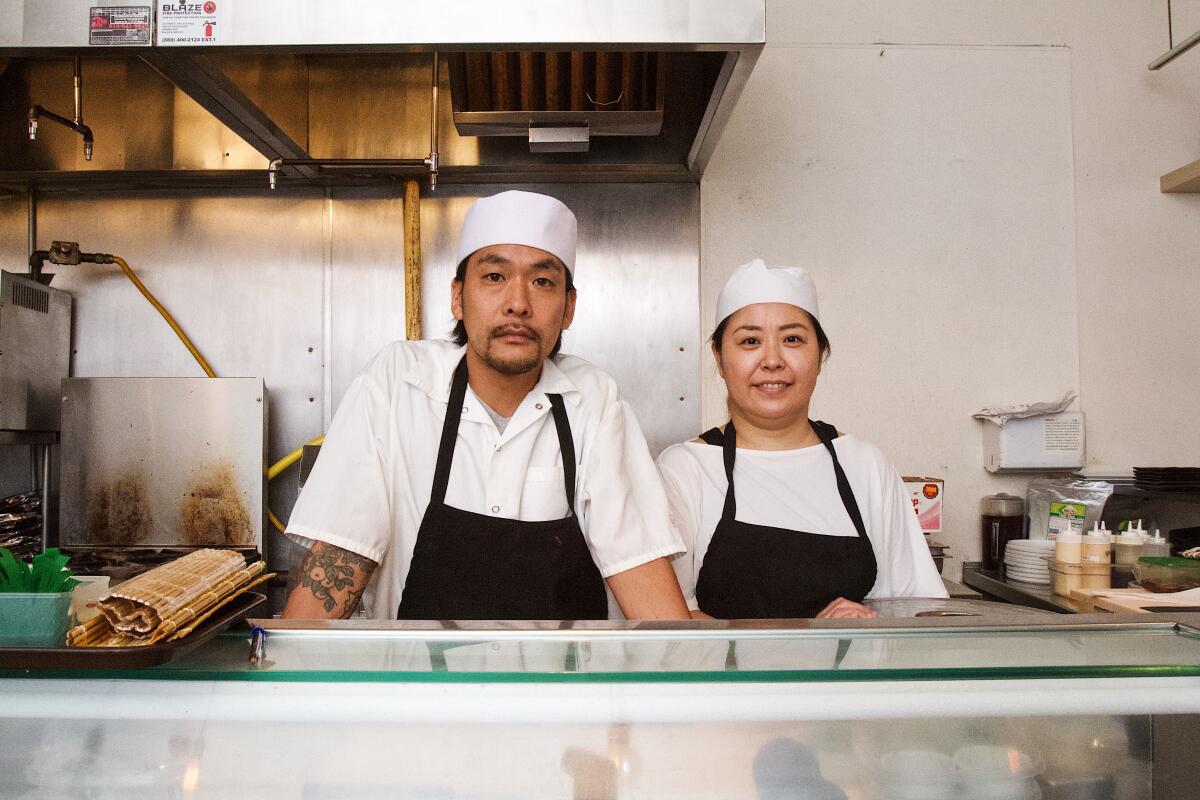
On multiple Thursdays a month, the team would prepare $600 to $800 worth of food for a single order from Paramount. Since the strike, that regular order — in addition to others — has dried up.
Despite the sizable loss, Bright and Sato say they support the writers strike on principle and with food: They’ve given out California rolls, shrimp tempura rolls and crispy rice at the Paramount picket line, in addition to coupons for free crispy rice to WGA members. They’re offering free crispy rice to all members of the guild — coupon or not — and, should the Screen Actors Guild also strike, Bright says she will extend the offer to them.
She knows her regulars, many of whom are writers. When business was down due to the pandemic, some would come to the Paramount lot for a single meeting but be sure to stop by Murakami for a chirashi bowl afterward. Orders like these helped keep the restaurant afloat, and now she sees her support during the strike as reciprocal. “They deserve the right pay,” Bright said. “We stand up together. While we were in the pandemic they came a lot to pick up orders, so we’re kind of helping each other.”
If actors go on strike they would join Hollywood’s writers, who are entering their sixth week of a walkout.
In the case of two L.A. restaurants, a generous running tab is helping to offset any losses attributed to the strike.
Last month, comedian and “The Price Is Right” host Drew Carey tweeted, “Ateention #WGA Folks! Show your WGA card at Bob’s Big Boy in Burbank or Swingers Diner on Beverly (near Fairfax) and your meal is free. For the duration of the strike. Dine-in only, Tip included. #WGAStrong #WGAStrike Spread your the word.”
At the Burbank Bob’s Big Boy, the ceramic plates and mugs clatter and the booths and swivel stools fill up fast with WGA members — especially on weekdays. According to Mike Lopez, who has managed the iconic diner for 33 years, Carey’s tab is roughly $7,000 every week and comparable to his contributions during the 2007-08 strike. By the end of the last strike, Lopez says, Carey paid between $85,000 and $90,000 for meals for WGA members.
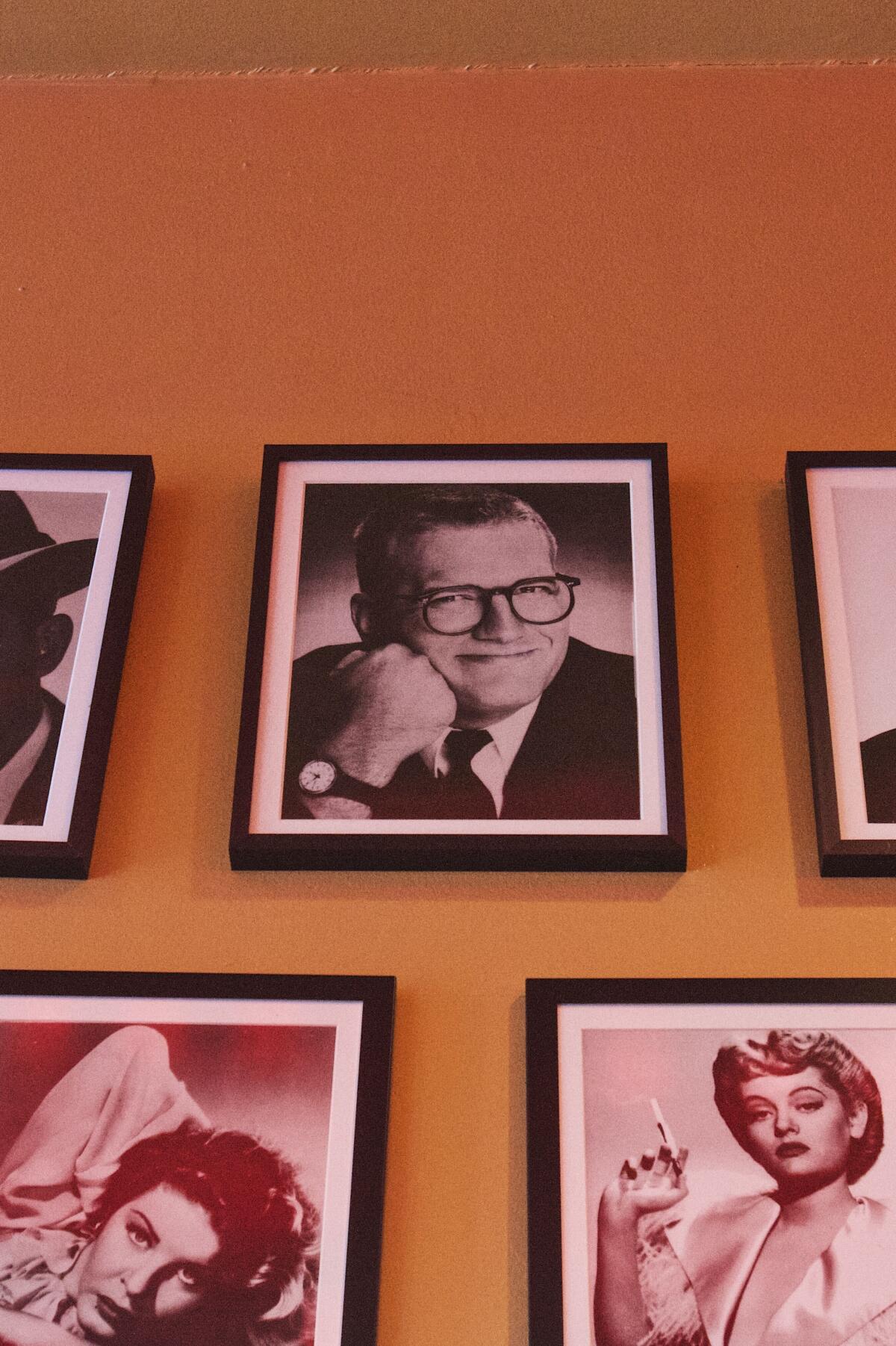
Carey, via his agent, declined to comment.
“It helps employees, it helps the whole community,” said Lopez. With Warner Bros., NBCUniversal and Disney nearby, many of the diner’s regulars work in the entertainment industry, and not just as writers. Lopez says that a number of its usual customers, including lot workers such as studio truck drivers, have dwindled as production work stalls. Carey’s contributions — now well past $20,000, with 20% tip included — have helped Bob’s maintain financial normalcy.
Swingers owner Stephanie Wilson says that business was more quiet as soon as the strike began, but since Carey’s announcement, his tab is well over $10,000 and the influx isn’t just helping monetarily: A number of the WGA diners have mentioned these are their first visits to the beloved Beverly Grove restaurant, and she hopes they’ll become repeat customers after the strike has ended.
Wilson describes Carey as a longtime customer and friend who frequents the restaurant multiple times a week — and even has a plaque on one of the swiveling plaid chairs at the diner’s counter. “It’s so moving,” she said, tearing up. “People are just not generous like that. He’s always looking out for everybody.”
The restaurant now serves 50 to 80 writers each day, and once a week some arrive en masse and on two wheels.
In the days before the Writers Guild of America called on members to strike, the creators of hit shows, including ‘Shrinking,’ ‘The Last of Us’ and more, gathered to discuss the state of the industry.
Bike the Strike, co-hosted by WGA members Steve Kriozere and Shem Bitterman, schedules meal stops at Swingers and Bob’s as its cycling strikers, usually in need of sustenance, trace a path across the city to all 10 picket locations. “Food is always a big part of our Bike the Strike activity,” screenwriter and playwright Bitterman said from the Swingers patio the day before a ride. “Food is a very anchoring event for us.”
“I’ve called this place ‘the cafeteria’ during the strike because it’s like going to your lunch break at school,” said Kroziere, a television writer who had planned on having lunch at Swingers with one friend and ran into multiple others while there. “Every direction you look, you see another writer.”
Writers often work from restaurants or coffee shops, but during the strike these “third spaces” have taken on crucial new roles: Restaurants offering free meals or discounts can serve as a gathering place for the striking writers, who now use them for meetings, brainstorming sessions and connecting with others who might aid their efforts.
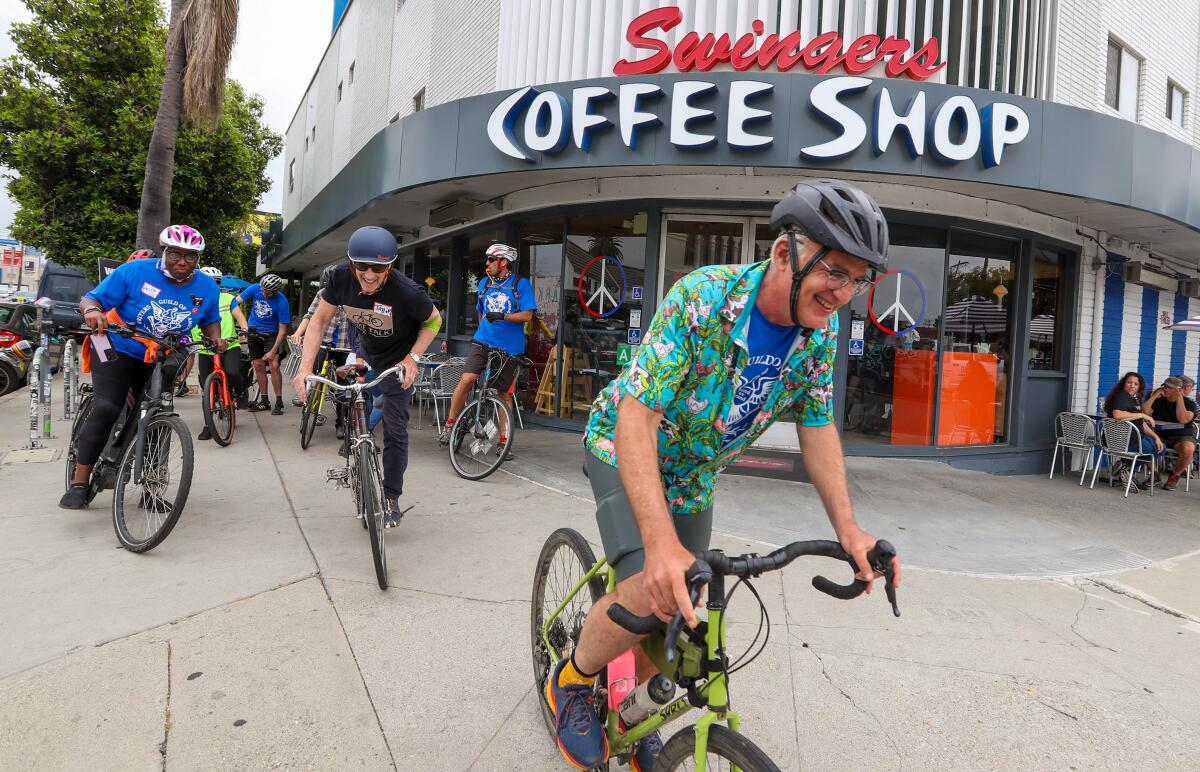
“I believe in collective action down to my bones,” said Bill Wolkoff, a screenwriting strike captain and lot coordinator for CBS Television City. “It’s become a community hangout and you see other writers who are striking at other lots, which gives us all more of a chance to connect with each other — which is the power of collective action.”
But it isn’t just the physical presence of restaurants making a difference for this strike; Kroziere, Wolkoff and Bitterman all say that in comparison to the 2007-08 WGA strike, this iteration has gained traction far beyond those in the entertainment industry and that support is reflected in food donations at the picket lines. It isn’t simply celebrities hiring food trucks like Yeastie Boys to feed the picketers — it’s ordinary people dropping off homemade items, and it’s organizations, agencies and other labor unions ordering delivery to feed the strikers.
The day after his lunch at Swingers, were it not for the strike, Wolkoff and some of his colleagues would have been attending the studio’s Season 2 premiere of his show, “Star Trek: Strange New Worlds.” To celebrate the launch anyway, a playwright and “Star Trek” fan who lives in Oregon organized a food delivery to the picket line at CBS Television City, coordinating with and pooling funds from L.A.-based “Star Trek” fans. When Wolkoff saw the folding table piled with boxes of Sidecar Doughnuts, brown paper bags full of HomeState tacos, and cartons of Coffee Bean coffee — paired with a delivery of coffee and Bagel Brokers breakfast sandwiches sent by the Democratic Socialists of America — he cried.
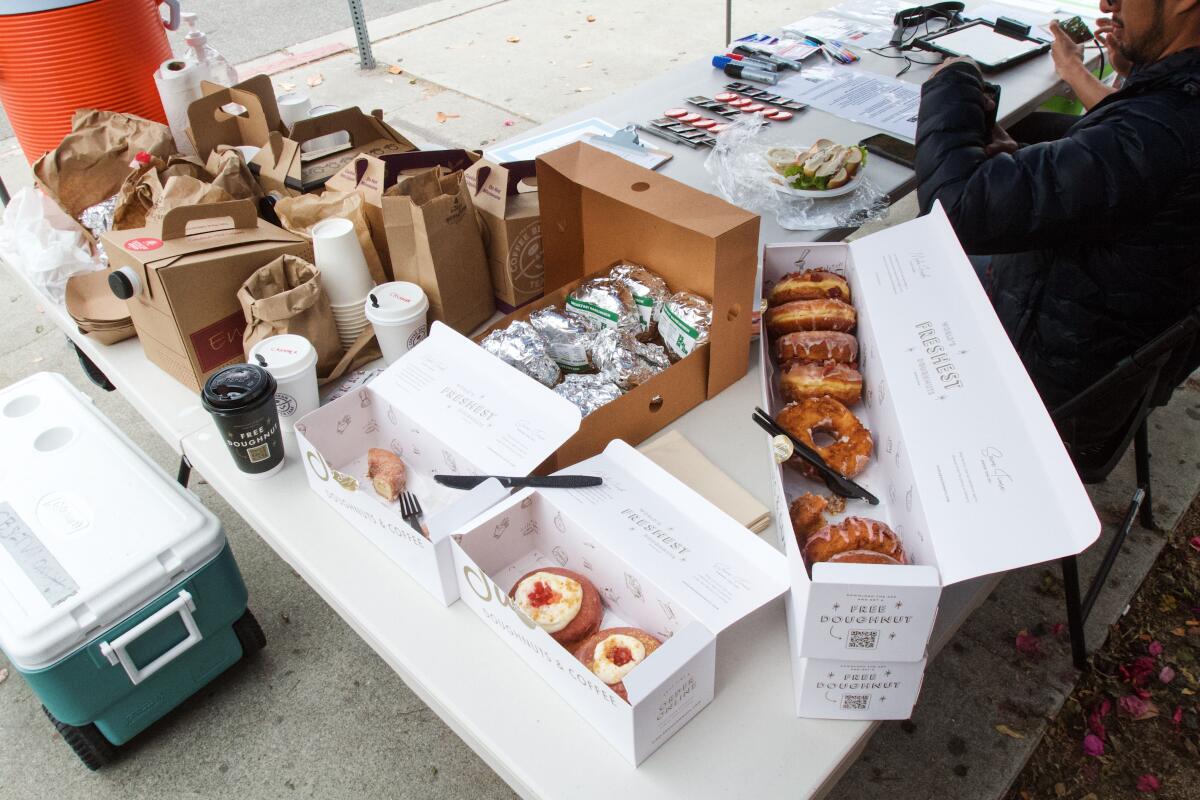
“It’s always a shot in the arm whenever something comes because not only is it sustenance as we’re out walking for hours, but it’s a sign that the community is behind us,” Wolkoff said, “and that the community believes in our labor action. It means so much to me. I thank everybody who has donated food to writers on the picket lines, I mean, it really injects you with adrenaline when something shows up.”
“My mom, for instance, is worried about me eating right,” Kroziere added at Swingers. “We might have taken a pay cut or zero pay, but I can tell my mom at least, ‘Hey, there’s plenty to eat.’”
More to Read
Eat your way across L.A.
Get our weekly Tasting Notes newsletter for reviews, news and more.
You may occasionally receive promotional content from the Los Angeles Times.
